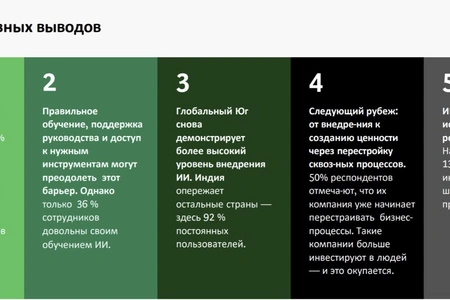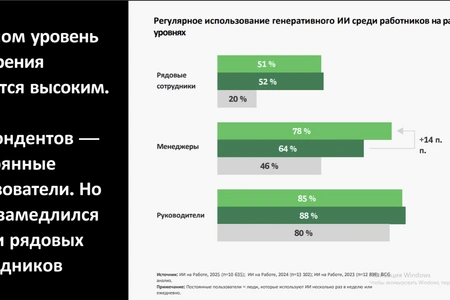BCG: Global South leads in AI adoption at work
- 21 July, 2025
- 15:16

The Global South is at the forefront of integrating artificial intelligence into everyday life and the workplace.
According to Report, this data comes from a new study by Boston Consulting Group (BCG) titled "AI at Work 2025: Momentum Builds, But Gaps Remain."
BCG’s third annual survey, based on responses from over 10,600 employees across 11 countries, shows that while AI adoption is generally high, only 51% of rank-and-file employees use AI regularly — a figure that has remained unchanged.
At the same time, the Global South is leading: in India, 92% of respondents use AI regularly, and in the Middle East, 87% — the highest figures among all countries, the report states.
BCG emphasizes that despite AI’s widespread popularity, concerns about job displacement due to automation are particularly strong in the Global South: “Their share is significantly higher than the global average of 41% of respondents who fear their profession may disappear within the next decade. In India, this number is 48%, and in the Middle East – 63%.”
The report highlights that successful AI integration at work requires employee training and leadership initiative.
Only 36% of employees feel they have received adequate training in AI use. According to BCG, user education increases the number of people who actively use AI.
At the same time, only one in four employees believes that leadership provides clear and timely guidance on working with AI: “Where leadership is engaged, the levels of adoption and employee optimism are significantly higher.”
BCG notes that as users become more aware of how to work effectively with AI, their anxiety levels decrease, and they begin to see the technology not as a competitor, but as a partner. While three-quarters of respondents believe AI agents will be vital to future success, only 13% say these agents are currently well-integrated into workflows, and just one-third of employees understand how they function.
“Companies that transform workflows and invest in people show significantly better results. But such transformation requires a clear strategy for managing personnel and a system to support AI integration and its impact on jobs, individual workers, and the workforce as a whole,” concluded Vincent Boche, Global Leader of BCG’s Human x AI practice and co-author of the report.



